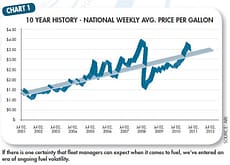The continued volatility of fuel prices impacts businesses, especially those with fleet vehicles. “According to PHH Arval, an increase of just one dollar, from $3.50 to $4.50, will increase the fuel expense of a fleet sedan by almost $550 per year. For light trucks, the increase is even tougher on a fleet budget — an even $800. If fuel increases just 50 cents more to $5, it will cost over $2,700 a year to tank up a passenger sedan and $4,000 for a light truck.” For a small company, the additional expense adds up quickly, eating into profits.
Some ways to combat this ever-fluctuating expense is modifying driving techniques, including obeying posted speed limits and better route navigation. Other methods are to maintain the vehicles well, including keeping the tires properly inflated and scheduling routine oil changes.
All of these can be monitored by using a GPS Tracking device. Depending on the features selected, a GPS tracking device can monitor driver behavior, navigate best routes to avoid excessive idling, and remind the fleet manager of routine maintenance.
Combining the drastic drop in hardware costs with the telematics improvement over the past few years, the return on investment has increased “from $80-$150 per month per unit in 2008 to $185-$255 per month per unit in 2011” according to a recent PHH Arval study.
While businesses may not be able to control fuel price changes, the business impact can be managed using a GPS tracking device.
Source: www.automotive-fleet.com/Channel/Fuel-Management/Article/Story/2012/06/Fleet-s-Brave-New-World-Fleets-Look-at-Challenges-Ahead.aspx?prestitial=1. Chart: ARI